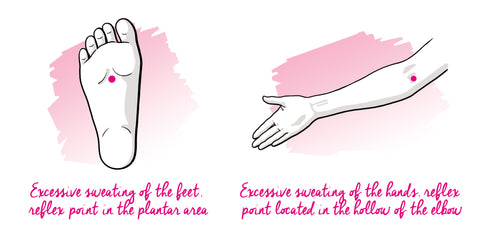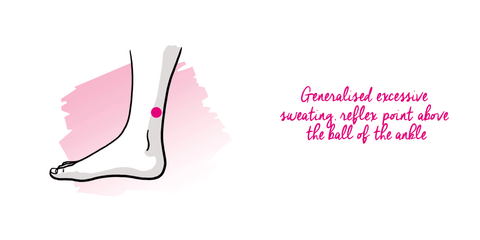What is sweating?
The main function of perspiration is to allow the body to maintain an optimal temperature of around 37°C. The sweat glands produce sweat, which is made up of mostly water evaporates through the pores of the skin, helping you to cool down. Sweating is a natural human function when we’re hot or when we exert physical effort.
Just like the passing of urine, sweating helps to detoxify the body. It allows toxins and metabolic waste products to leave our system’s safely.
The third function of sweat is to protect the skin. In fact, it lubricates the skin and helps to limit the generation of heat when friction occurs.
On average, humans secrete 1 litre of sweat per day, which equates to approximately 580 kilocalories.
Under the same climatic conditions, men sweat in greater quantities and more quickly than women do.
Why do we sweat at night?

Sweating is a completely normal phenomenon that helps to cool our bodies down, but if the temperature of the room you sleep in isn't warm, it shouldn’t happen. Factors such as menopause, alcohol consumption, certain foods, diabetes, thyroid or gastroesophageal disorders, other medical conditions or stress can increase the amount of sweat we produce at night.
To minimise sweating at night, try these simple tips:
- Maintain an appropriate temperature in the bedroom, ideally around 18-19°C
- Wear light pyjamas, made from natural materials
- Drink water to avoid dehydration
- Avoid consuming stimulating drinks like coffee or alcohol, or heavy, spicy foods before sleeping
- Wait for a few hours after the meal before going to bed - ideally 2 to 3 hours minimum
The causes of night sweats cannot always be explained. It’s vital to consult a doctor if you experience them frequently, especially if accompanied by other symptoms.
What is excessive sweating?

Excessive sweating on the hands, feet, armpits or all over the body is called hypersweating. It can seriously obstruct the psychological state, and ultimately the quality of life, of the person affected by it.
Localised Hyperhidrosis
In 90% of cases, excessive sweating is localised in certain areas of the body, and occurs equally on both sides. It usually occurs at least once a week and stops at night when the body is at rest.
The areas most often affected are:
- Armpits
- Palms of the hands
- Soles of the feet
Generalised Hyperhidrosis
Generalised Hyperlhidrosis represents about 10% of cases and affects the whole body. There is no age limit, andgenerally symptoms will lead to a consultation with a health specialist to find a cause, in order to receive treatment and restore quality of life.
Is it serious to sweat a lot?
Excessive sweating or hyper sweating does not have serious consequences for the health of the patient, except for the fact that it can contribute to the development of skin diseases such as mycoses, warts, etc.
For the majority of people, the limiting point is the strong impact it can have on their social and professional life, affecting their self-image and confidence considerably. This can, unfortunately, lead to social anxiety and even depression.
If you suffer from excessive sweating, we recommend that you consult a health professional or dermatologist to eliminate potential underlying causes and find a solution.
How to manage excessive sweating

As a first step, contact your doctor or other medical professional for advice. They will be able to advise you of a suitable medical treatment if the methods below aren’t successful.
Use an antiperspirant or Alum Stone
- Antiperspirants: tighten the pores of the skin, due to the presence of aluminium salts in their formula. Aluminium salts are deposited on the surface of the sweat duct and slow down the flow of perspiration. While allowing you to sweat less, their use is often criticised for being associated with breast cancer risks .
- An Alum Stone : contains traces of aluminium salts, allowing it to act in the same way as an antiperspirant. There are both natural Alum Stones, composed of potassium sulphate, and synthetic ones made from ammonium and aluminium.
Remove hair regularly
By removing the hair that grows in areas which sweat a lot, the sweat can’t adhere to it. This adhesion can be a source of the unpleasant odour associated with sweating.
Pay attention to your diet
Some food and drinks can promote the production of sweat. Elminating them from your diet could help you to manage your perspiration.
- Alcohol
- Tobacco
- Coffee and tea
- Spicy food
Wear suitable clothing
If you sweat a lot, it’s important to wear suitable clothing. Avoiding synthetic clothing and instead opting for natural materials like linen, cotton or wool can help you minimize your sweat leavel. Choosing loose-fitting clothes in light colours. and only wearing them once can also help, as can washing clothes with a disinfectant. To avoid sweaty feet, steer clear of shoes made from plastic and other synthetic materials.
Medical treatment
- An antiperspirant treatment aims to obstruct the sweat glands responsible for perspiration. This treatment is irritating to the skin, so its crucial to follow the precautions carefully.
- Botulinum toxin (Botox) injections can stop the production of sweat.
- Iontophoresis is a medical device that uses a weak electric current to pass certain molecules through the skin. It is proven to reduce sweat production.
Our natural recipes also reduce excessive sweating:
|
Excessive Sweating  |
Apply a few drops of Palmarosa essential oil diluted in the same quantities of Jojoba vegetable oil to the affected areas with your fingertips From 15 years of age.
OR
Mix 2 drops of Clary Sage essential oil + 2 drops of Cypress essential oil with 1 spoonful of Macadamia vegetable oil. Apply the mixture to the soles of the feet and under the armpits in the evening after washing. Use until an improvement is seen, but do not use this formula for more than 3 weeks in a row. From 15 years of age.
|
Excessive sweating |
Mix 1 drop of Palmarosa essential oil + 1 drop of Cypress essential oil with 1 teaspoon of Jojoba vegetable oil. Apply the mixture under the soles of the feet, hands and under the armpits, every other day after washing, in the morning. For adults only. |
3 key points to combat excessive sweating in general, feet or hands.


A physiotherapist's advice:
Often, excessive sweating is linked to stress, whether chronic or acute, which the body seeks to get rid of, in this very healthy way... "It makes me sweat!"
Sure, we’d love to evaporate stress, but sweating profusely can also come from a hormonal imbalance – for example: hot flushes during the menopause, thyroid problems and more. In these cases, and because it is never pleasant to sweat too, massages have their place. They have a real impact on the hormonal system, and everyone knows that a massage is deeply relaxing. But what few people know are the correct reflex points, which are very useful for calming the production of our sweat glands.
How to reduce foot perspiration?

Foot perspiration, in addition to being unpleasant and associated with bad odours, encourages the proliferation of fungi, and can therefore lead to the development of mycosis.
To lower the risk, try the following tips:
- Change your shoes every day, if possible, especially if you sweat a lot. This will allow your shoes to dry out properly between uses and prevent fungus from forming.
- Change your socks at least once a day. Keep a second pair of socks with you at all times, so you can change them whenever you need.
- Air your feet as often as possible. Go barefoot at home or whenever you can.
How do you eliminate armpit or foot odour completely?

Since sweat is 99% water, so it’s naturally odourless. However, when it comes into contact with bacteria on the skin, a smell develops and continues to get stronger.
If you notice that your sweat suddenly smells bad, here are some reasons that could explain it:
- Diet – ingredients like garlic, onions, some spices, animal proteins and coffee can affect the way you smell
- Illness - consult your doctor for advice
- Medication - seek advice from a health professional who can help you address it
- Stress
- Clothing – polyester, acrylic or other synthetic materials could be the cause
We recommend that you wash your underarms at least twice a day and be sure to dry them well. Next, use a deodorant to mask or remove any odour. Deodorants work on the odours by targeting the bacteria that cause them.
Bactericidal, fungicidal and deodorant essential oils such as Tea Tree, Lemon, Rockrose, Cypress or Palmarosa are a natural, effective alternative to chemical deodorants.
Read on for three recipes for natural deodorant, to help you eliminate odours linked to underarm or foot sweat:
|
Organic Deodorant  |
Pour 2 drops of Tea Tree or Palmarosa essential oil and 1 drop of Cypress essential oil into 5 drops of a neutral vegetable oil such as Sweet Almond, or Macadamia.
Apply this mixture twice a day to the armpits. From 15 years of age. |
Deodorant |
Apply a few drops of Palmarosa essential oil diluted in an equal amount of neutral vegetable oil such as Macadamia, Sweet Almond or Jojoba to the soles of the feet and the underarms, using your fingertips. From 15 years old. |
Antibacterial Foot Deodorant |
Mix 2 drops of Tea Tree essential oil + 1 drop of Cypress essential oil with 2 drops of neutral vegetable oil such as Sweet Almond or Macadamia. |
For any therapeutic use, consult a doctor or a pharmacist. Refer carefully to the contraindications and precautions for use of each essential oil. In case of doubt, consult a health professional.

